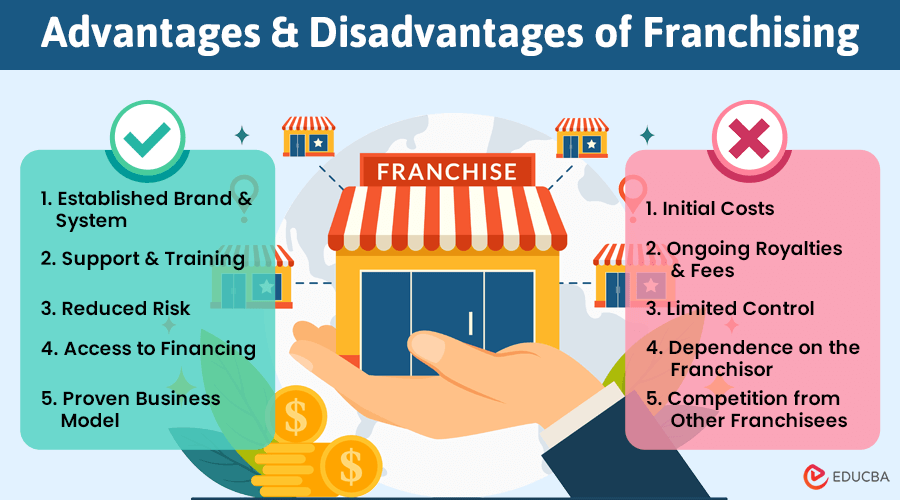Franchising
Franchising is a kind of business model in which a business entity, i.e., the franchisor, grants another individual or company, i.e., the franchisee, the legal right to use its brand name, services, products, and operating systems in exchange for some fee. It provides several benefits for both franchisors and franchisees, but it also has drawbacks. In this article, we will look at the advantages and disadvantages of franchising which will help you understand how it can impact your business.

Advantages of Franchising
1. Established Brand and System
One of the main advantages of franchising is that franchisees get to operate their own business using the established brand and systems of the franchisor. This includes access to the franchisor’s marketing, advertising, product offerings, and support services, which can help franchisees get a head start and avoid many of the challenges associated with starting a business from scratch.
2. Support and Training
Franchisees also receive comprehensive support and training from the franchisor, which can help them get started quickly and operate their business effectively. This includes help with site selection, lease negotiation, and operational setup, as well as ongoing training and support in marketing, customer service, and employee management. Some may even offer tools, like an email platform with branded franchise templates, without added fees.
3. Reduced Risk
Franchising can also help reduce the risk associated with starting a business. This is because franchisees can benefit from the franchisor’s established brand and systems and the franchisor’s experience and expertise in the industry. Also, franchisees typically receive ongoing support and guidance from the franchisor, which can help them overcome any challenges they may face.
4. Access to Financing
Another advantage of franchising is that franchisees may have greater access to financing than they would if starting a business from scratch. This is because many franchisors have relationships with lenders and financial institutions that can provide financing to franchisees and because franchisors often offer support to help franchisees manage their finances effectively.
5. Proven Business Model
The advantage of starting with a tested and proven model can help franchisees achieve success more quickly than starting a business from scratch. With a proven business model, franchisees benefit from the franchisor’s experience and expertise in the industry. For example, franchisees can benefit from the franchisor’s techniques of marketing and advertising which can help them attract customers more quickly and easily.
Disadvantages of Franchising
1. Initial Costs
For many potential franchisees, the requirement to pay an upfront franchise fee can be a significant financial burden. This expensive investment reduces the amount of capital available for other important expenses and imposes financial obligations and expectations on the franchisee. In addition, the total initial costs required, including franchise and training fees, can be substantial and may not provide the return on investment that franchisees seek.
2. Ongoing Royalties and Fees
Franchisees are typically required to pay ongoing royalties and fees to the franchisor, usually a percentage of their sales or profits. The persistent nature of these royalties and fees can be challenging for franchisees, as they can limit their ability to invest in their business and grow their profits. For example, if the franchisor raises the royalties or fees, franchisees may find it challenging to keep up and may have to reduce their spending on equipment, supplies, and other business investments.
3. Limited Control
Another disadvantage of franchising is that franchisees have limited control over the day-to-day operations of their business. This is because they must abide by the franchisor’s established systems, processes, and procedures and comply with its guidelines and standards. This can limit a franchisee’s ability to make decisions and implement changes that they believe would benefit their business.
4. Dependence on the Franchisor
Franchisees also depend on the franchisor for ongoing support, training, and guidance, which can limit their ability to operate independently. This can be a disadvantage if the franchisor is not responsive and supportive or changes the franchise agreement terms without sufficient notice.
5. Competition from Other Franchisees
Another disadvantage of franchising is that franchisees may face competition from other franchisees operating under the same brand and using the same products, services, and systems. This can make it difficult to differentiate your business and stand out in the market, impacting your profitability and success.
Conclusion – Advantages and Disadvantages of Franchising
Franchising can be a valuable opportunity for entrepreneurs who want to start and operate their businesses with the support and resources of an established brand. However, it is essential to carefully consider the advantages and disadvantages of franchising before making a decision. By understanding the costs involved, the limitations on control and independence, and the potential for competition and financial strain, you can make an informed decision about whether franchising is right for you and your business goals.
